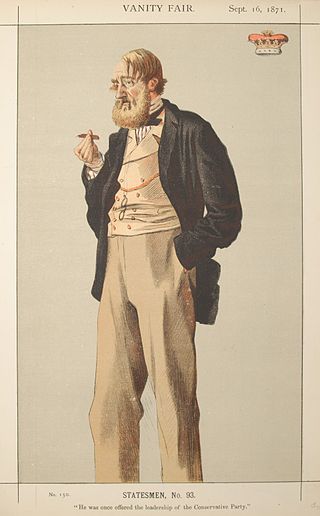Charles Manners, 6th Duke of Rutland
British nobleman and politician (1815–1888) From Wikipedia, the free encyclopedia
Charles Cecil John Manners, 6th Duke of Rutland KG (16 May 1815 – 3 March 1888, in Belvoir Castle), styled Marquess of Granby before 1857, was an English Conservative politician.
The Duke of Rutland | |
|---|---|
 Caricature by Coïdé published in Vanity Fair in 1871. | |
| Member of Parliament for Stamford | |
| In office 1837–1852 | |
| Preceded by | Thomas Chaplin George Finch |
| Succeeded by | J. C. Herries Sir Frederic Thesiger |
| Member of Parliament for North Leicestershire | |
| In office 1852–1857 | |
| Preceded by | Lord Charles Manners Edward Farnham |
| Succeeded by | Edward Farnham John Manners |
| Lord Lieutenant of Leicestershire | |
| In office 13 February 1857 – 3 March 1888 | |
| Preceded by | The Duke of Rutland |
| Succeeded by | The Earl Howe |
| Personal details | |
| Born | 16 May 1815 |
| Died | 3 March 1888 (aged 72) Belvoir Castle, Leicestershire, England |
| Political party | Conservative |
| Parents |
|
| Relatives | John Manners (brother) George Manners (brother) Emmeline Manners (sister) |
| Education | Eton College |
| Alma mater | Trinity College, Cambridge |
Background and education
Manners was the third but eldest surviving son of John Manners, 5th Duke of Rutland and Lady Elizabeth Howard, daughter of Frederick Howard, 5th Earl of Carlisle. John Manners, 7th Duke of Rutland and Lord George Manners were his younger brothers. He was educated at Eton and Trinity College, Cambridge, earning an MA in 1835.[1]
Political career
Summarize
Perspective

Entering politics as Member of Parliament for Stamford in 1837, Manners became known as a voluble, if not particularly talented, protectionist. He briefly held office as a Lord of the Bedchamber to Prince Albert from 1843 to 1846.[2] Following the resignation of Lord George Bentinck from the leadership of the protectionists in the House of Commons at the beginning of 1848, Granby (as he was then known) became the leader on 10 February 1848, as Benjamin Disraeli was unacceptable to Lord Derby, the overall leader of the party, and the majority of the rank and file. Granby resigned on 4 March 1848, feeling himself inadequate to the post, and the party functioned without an actual leader in the Commons for the remainder of the parliamentary session.
At the start of the next session, affairs were handled by the triumvirate of Granby, Disraeli, and J. C. Herries. This confusing arrangement ended with Granby's resignation in 1851. He also declined to join the First Derby Ministry in 1852, and was appointed Lord Lieutenant of Lincolnshire instead. Granby succeeded to the dukedom of Rutland on the death of his father in 1857. He was made a Knight of the Garter in 1867. He also succeeded his father as Lord Lieutenant of Leicestershire, which post he held until his death on 4 March 1888,[2] at the age of 72.
Personal life
Rutland never married. He had cherished a passion for Mary Anne Ricketts, later Lady Forester, but his father forbade the two to marry. He was also devoted to Lady Miles, wife of Sir Philip Miles, and scandalised society by leaving her his 120 ft yacht, Lufra, in his will.[3] He was succeeded in the dukedom by his brother John.[2]
He owned 70,000 acres with most 30,000 acres in Leicester, 27,000 acres in Derby and 6,500 acres in Cambridge.[4]
Coat of arms
 |
|
Notes
References
External links
Wikiwand - on
Seamless Wikipedia browsing. On steroids.
